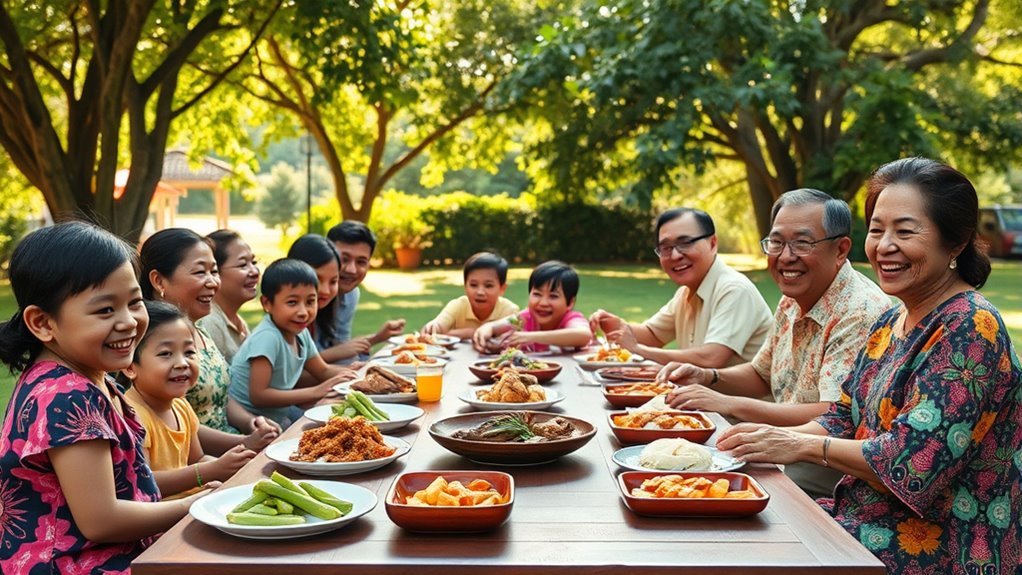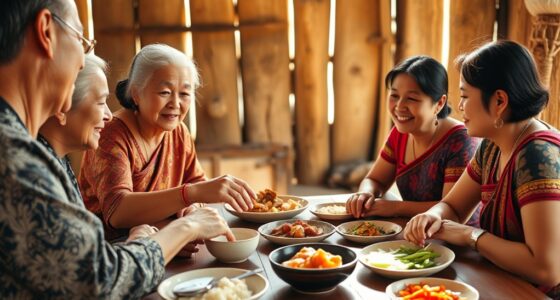Family’s central to Filipino relationships because it shapes your social identity and support systems. You prioritize family over individualism, creating strong ties that foster interconnectedness and resilience. Elders are respected sources of wisdom, while gatherings reinforce bonds and community spirit. The concept of “kapamilya” extends compassion beyond blood relations, highlighting mutual care. Balancing modernity and tradition, families adapt while holding onto cultural values. There’s so much more to uncover about this profound connection that defines Filipino life.
Key Takeaways
- Family is the primary social unit in Filipino society, fostering strong emotional and financial support systems during challenging times.
- The concept of “kapamilya” emphasizes extensive kinship, creating deep connections beyond immediate family and promoting inclusiveness.
- Elders are respected and serve as sources of wisdom, reinforcing family bonds and guiding decision-making within the household.
- Economic interdependence among family members enhances resilience, with collective pooling of resources during crises and support from Overseas Filipino Workers (OFWs).
- Traditional Filipino values, like *pakikipagkapwa* and *utang na loob*, cultivate empathy and reciprocity, strengthening social ties and relationships within the community.
The Role of Family as the Cornerstone of Society
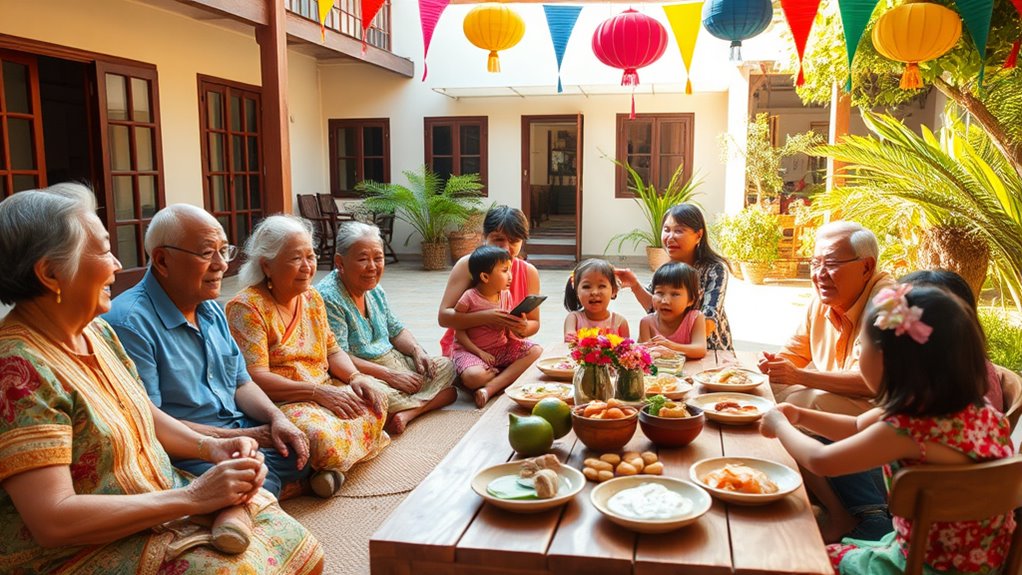
When you think about Filipino society, it’s clear that family serves as its cornerstone. The family is the primary social unit, shaping both individual lives and broader societal structures.
With strong ties, Filipinos prioritize family over individualism, fostering interconnectedness that extends beyond the nuclear unit. Economically, families act as crucial support systems, providing financial and emotional assistance, especially during tough times. The concept of “bayanihan” embodies this spirit of mutual aid.
Additionally, families transmit cultural values and traditions, shaping responsible citizens who respect and care for their elders. Ultimately, strong familial bonds not only enhance social cohesion but also contribute greatly to the stability and resilience of communities, making family indispensable in Filipino relationships.
Understanding the Extended Family and Close Ties
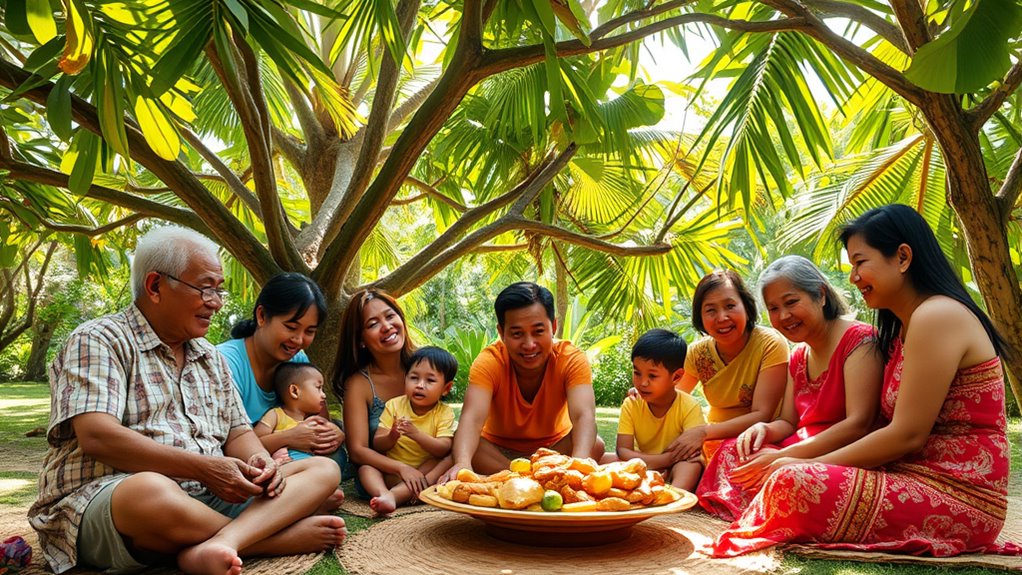
In Filipino culture, the concept of family extends far beyond the nuclear unit, encompassing a wide network of relatives that includes grandparents, aunts, uncles, and even close friends regarded as family.
This extended family structure, often referred to as “kapamilya,” emphasizes bilateral kinship, connecting you to both your mother’s and father’s sides. Multi-generational households are common, with grandparents often living nearby, providing support in childcare and other responsibilities.
You’ll find that these tight-knit relationships create a strong support system during times of need, like illness or financial hardships. Family gatherings reinforce your bonds, fostering a sense of belonging and loyalty while also shaping your cultural identity.
Such connections are essential, even if they sometimes bring pressure or tension.
The Importance of Respect for Elders

Respecting elders is a fundamental aspect of Filipino culture that shapes interactions and relationships from an early age. This deeply ingrained value influences daily life and social customs, serving as a pillar of the culture.
You learn to address elders using respectful terms like “po” and “opo,” showing acknowledgment and reverence. The gesture of “pagmamano,” where you take an elder’s hand and press it to your forehead, is a cherished practice that signifies your request for their blessing.
Elders are viewed as essential sources of wisdom, and their guidance plays a significant role in decision-making. By respecting them, you not only strengthen family bonds but also foster societal harmony, ensuring the continuation of traditions and values across generations.
Family Roles and Obligations in Filipino Culture

Family roles and obligations in Filipino culture are deeply rooted in tradition, shaping how each member interacts and contributes to the household.
Fathers typically serve as the primary breadwinners, while mothers manage the home and nurture children. Parents instill moral values and good manners in their kids.
Fathers are the primary providers, while mothers nurture and instill essential values in their children.
Children are legally obligated to support their parents financially, reflecting the cultural expectation of “utang na loob.” Eldest siblings often take on supervisory roles, helping with chores and education.
The extended family, including grandparents and aunts, contributes to childcare and emotional support. This collective responsibility fosters interdependence, where adult children are expected to care for aging parents, creating a strong safety net for the entire family.
Building a Support System Through Family
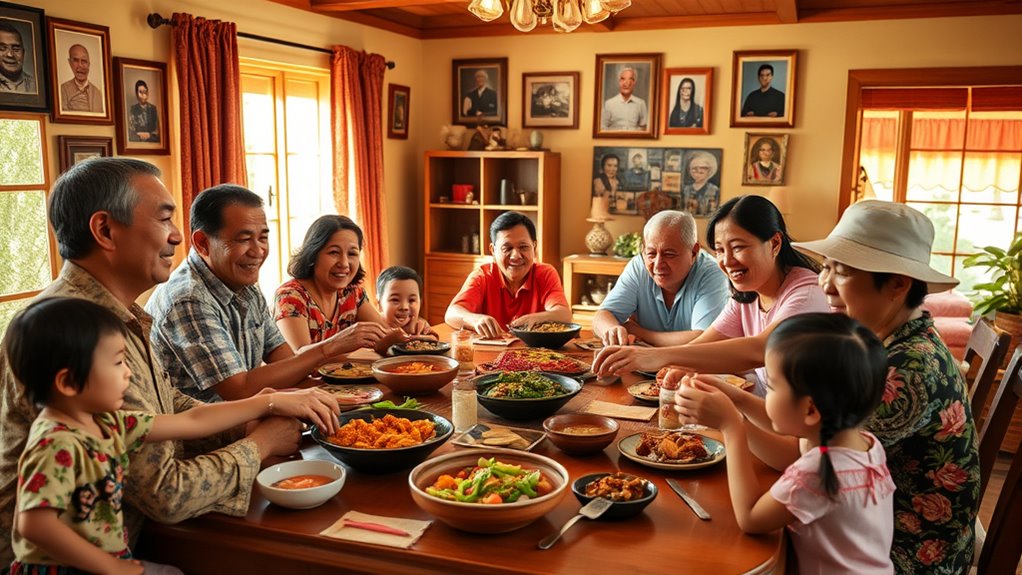
While steering through life’s challenges, you’ll often find that building a support system through family can be invaluable.
In Filipino culture, the family extends beyond just parents and children, encompassing grandparents, aunts, uncles, and even distant relatives. This close-knit structure provides emotional solace, guidance, and a profound sense of belonging. Understanding the importance of senior safety and fraud prevention can help families protect their elderly members from potential risks. This emphasis on family reflects the Filipina culture where relationships are deeply rooted in interconnectedness. Additionally, families can play a crucial role in providing emotional support during difficult times, helping each member navigate their personal challenges.
When times get tough, your family rallies around you, offering practical support such as childcare, meals, or even financial assistance. Celebrating traditions together and sharing stories strengthen these bonds, creating a comforting safety net.
The values of “utang na loob” and “bayanihan” foster loyalty and cooperation, ensuring you never face life’s hurdles alone. Embracing your family’s support truly enriches your journey through life. Additionally, understanding the dynamics of family and elderly support can enhance the caregiving experience for everyone involved.
Resilience and Economic Interdependence Among Family Members
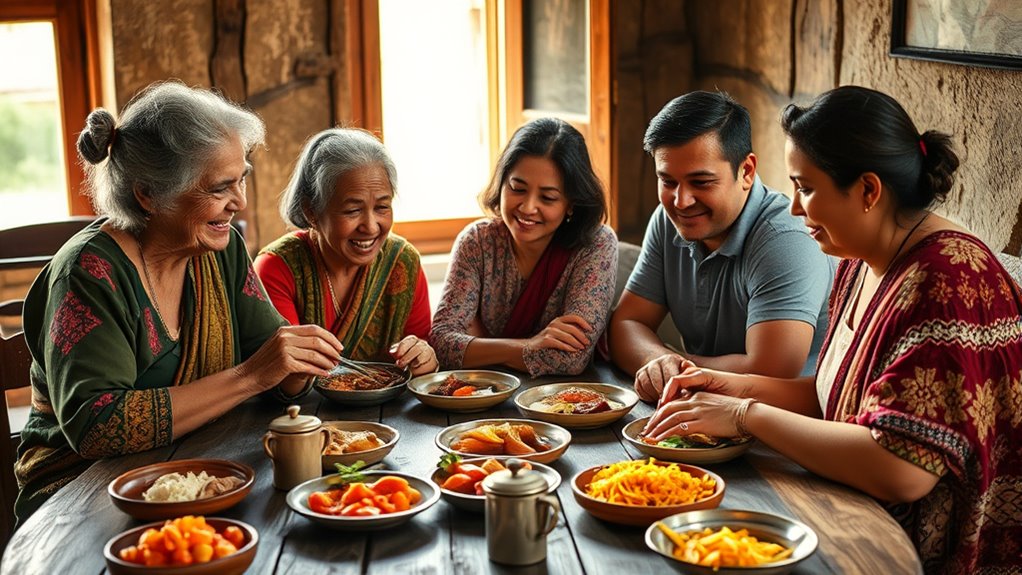
As economic challenges arise, resilience among family members in Filipino relationships becomes increasingly essential.
OFW remittances greatly bolster the economy, contributing 8.3% of GDP in 2024. Families act as primary economic units, pooling resources during crises and supporting one another through shared responsibilities.
Interdependence is evident as married children often help their parents financially, demonstrating a culture of sharing. The bayanihan spirit fosters collective action, creating safety nets during tough times.
However, reliance on remittances can lead to dependency, and larger family sizes may increase vulnerability to economic shocks.
Building resilience involves preparing for disasters, promoting financial inclusion, and encouraging diverse livelihoods, ensuring that families can navigate economic uncertainties together.
Cultural Transmission and the Significance of Gatherings
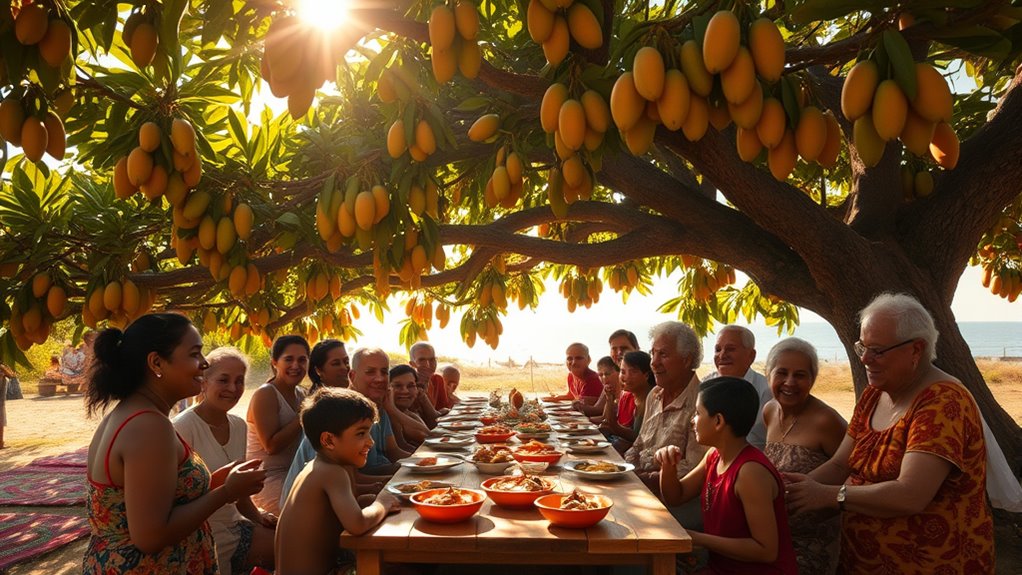
Cultural transmission thrives within Filipino relationships, particularly during gatherings that serve as crucial touchpoints for family and community.
These events—birthdays, holidays, and reunions—reinforce bonds and celebrate traditions. You learn core values like respect, loyalty, and kindness from your family, especially through interactions with elders and extended relatives.
Gatherings offer opportunities for storytelling, where grandparents share family history and folklore, ensuring cultural continuity.
Food plays a significant role, with traditional dishes symbolizing shared heritage and togetherness. Communal meal preparation fosters connection, while rituals like “pagmamano” remind you of filial piety.
These gatherings not only strengthen familial ties but also perpetuate Filipino culture, creating lasting memories that shape your identity and values for generations to come.
The Influence of Religion on Family Values
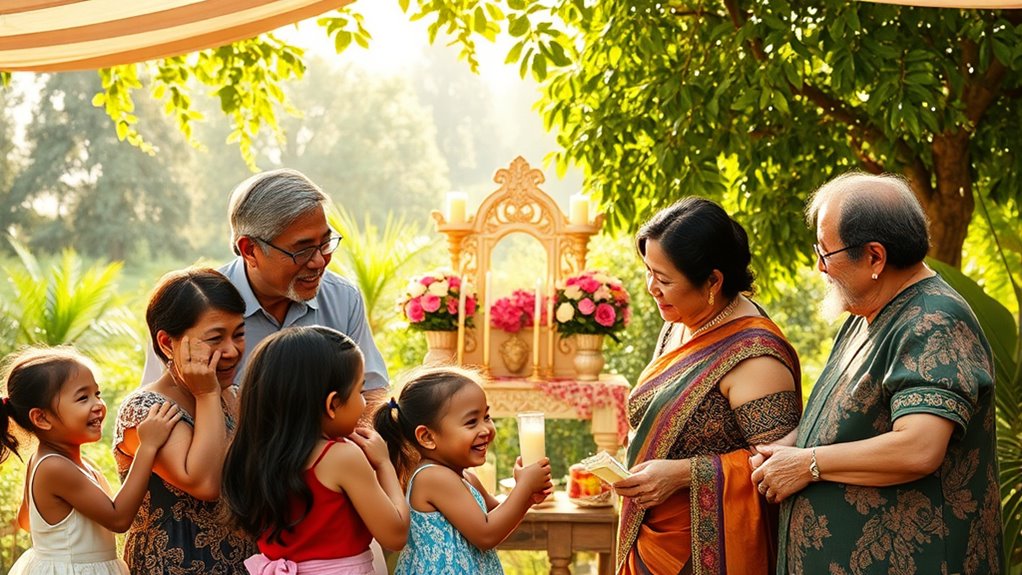
Religion deeply influences family values in Filipino culture, shaping how you perceive relationships and responsibilities. With over 80% of the population identifying as Catholic, teachings on marriage, family unity, and respect for elders are central to your beliefs.
These principles promote honesty, kindness, and forgiveness, reinforcing the family as the basic societal unit. Religious rituals, like attending Mass and celebrating significant milestones, strengthen family bonds and cultural identity.
Religious principles foster honesty and kindness, solidifying the family as the cornerstone of Filipino culture.
You often honor elders, reflecting the respect ingrained in religious teachings. The church’s role in community life extends kinship ties, fostering a collective spirit.
While modernization challenges traditional norms, faith remains a crucial coping mechanism, helping you navigate life’s hardships alongside family support.
The Concept of “Kapamilya” and Its Impact on Relationships
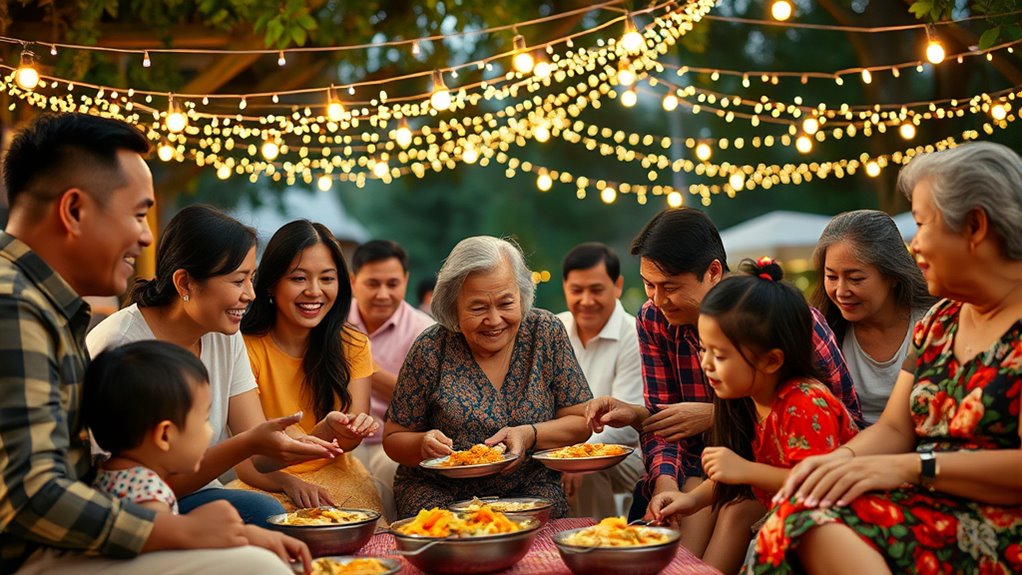
The concept of “kapamilya” embodies a profound sense of belonging and interconnectedness that shapes relationships in Filipino culture. It signifies that being part of the family goes beyond blood ties, creating a vast network of support that includes grandparents, cousins, and even close friends.
This inclusiveness fosters a shared identity and emphasizes mutual care, ensuring you’re never alone in times of need. Your interactions are guided by *pakikipagkapwa*, encouraging empathy and sensitivity towards others.
As you navigate daily life, the principles of *utang na loob* reinforce reciprocity, making you aware of your obligations to others.
Fundamentally, “kapamilya” creates a solid foundation for emotional and social support, deeply influencing your relationships and community bonds.
Frequently Asked Questions
How Do Family Dynamics Differ in Urban vs. Rural Filipino Settings?
You might think family dynamics are the same everywhere, but in the Philippines, they differ markedly between urban and rural settings.
In rural areas, families tend to be larger and roles are more traditional, with children often working alongside parents.
In urban regions, families are generally smaller, with more fluid roles as women join the workforce.
Economic pressures also lead to multigenerational households, blending traditional and modern influences on family life.
What Role Do Family Friends Play in Filipino Culture?
In Filipino culture, family friends play an essential role as part of the extended family network.
You’ll find that these close friends often receive honorary titles like “Tita” and “Tito,” reflecting respect and affection. They’re regularly invited to family celebrations and offer emotional and practical support during tough times.
How Are Family Disputes Typically Resolved in Filipino Households?
In Filipino households, resolving family disputes often starts with direct conversation. You’ll find that open communication is encouraged, allowing everyone to express their thoughts respectfully.
Active listening is key, so make eye contact and ask clarifying questions. Elders typically guide discussions, and their opinions carry weight.
If needed, neutral third parties, like community leaders, may mediate. Ultimately, the focus is on empathy, understanding different perspectives, and finding common ground to reach compromises.
What Impact Does Globalization Have on Filipino Family Structures?
Globalization markedly reshapes Filipino family structures, pushing many to seek work abroad.
You might notice traditional roles shifting, with mothers often becoming primary breadwinners while fathers take on caregiving responsibilities.
As families become smaller and more dual-income households emerge, the dynamics change.
While remittances support families financially, the physical distance can lead to emotional gaps, altering how you connect with family members and navigate relationships in a rapidly evolving world.
How Do Modern Technology and Social Media Affect Family Relationships?
You might think technology pulls families apart, but in reality, it strengthens bonds.
With mobile phones and social media, you can connect with loved ones instantly, no matter the distance. Video calls allow you to share moments, making you feel present during important events.
While it’s true that excessive use can hurt face-to-face interactions, the benefits of staying connected far outweigh the negatives, keeping relationships alive and thriving in today’s fast-paced world.
Conclusion
In the heart of every Filipino, family beats like a drum, resonating with love and loyalty. These bonds weave a vibrant tapestry of support, tradition, and resilience, reminding you that no one walks this journey alone. As you cherish your own family ties, you embrace a legacy rich in respect and unity. Remember, each gathering is a celebration of life, a reminder that in the embrace of your loved ones, you find strength, joy, and an unbreakable connection.
